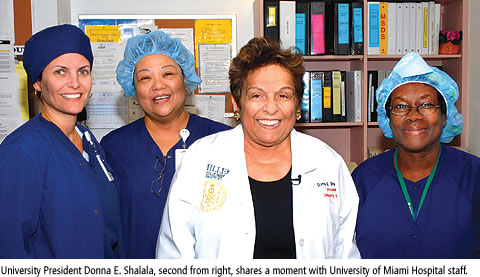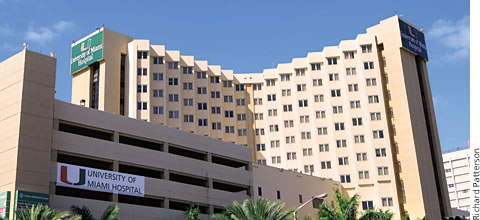
The acquisition of the private University of Miami Hospital is a great accomplishment for the Miller School of Medicine and a giant step forward for health care in the region. As a result, the hospital will also play another significant organizational role. It is the focal point for the launch of UHealth—the new University of Miami Health System.
 Under the UHealth banner, University of Miami Health System combines excellence in lifesaving clinical care with the academic strength of the Miller School’s groundbreaking research and innovative medical education. Under the UHealth banner, University of Miami Health System combines excellence in lifesaving clinical care with the academic strength of the Miller School’s groundbreaking research and innovative medical education.
“From this point forward we will no longer be just a medical center—we are now a comprehensive health system that stretches across a wide geographic area that can serve patients both locally and from around the world,” says Pascal J. Goldschmidt, M.D., senior vice president for medical affairs and dean of the Miller School of Medicine. “University of Miami Health System will make South Florida a medical destination that patients will seek out for their medical care.”
What is it about South Florida’s only university health system that makes it so powerful and unique? William O’Neill, M.D., executive dean for clinical affairs, explains it in the simplest of terms: “UHealth is an 800-person, multi-specialty academic group practice made up of some of the best minds in medicine who are uniquely qualified to treat the most complicated of cases.”
O’Neill points out that patients today tend to be sicker, with more complicated issues. “Take as an example a patient who comes in with a breast mass that needs to be removed, but she also has diabetes and a cardiac stent. With today’s fragmented health care delivery, treating this type of patient would be extremely difficult—but in a university-based system you have the ability to partner with a lot of practitioners who can take care of this patient at the same time and all under the same roof.”

In addition to UM Hospital, the UHealth roof also covers two other University hospitals, Sylvester Comprehensive Cancer Center and Bascom Palmer Eye Institute; three major affiliated institutions, Jackson Memorial Hospital, Holtz Children’s Hospital, and Miami VA Medical Center; and more than two dozen outpatient facilities.
University health systems clearly set the bar in many key areas of health care. In addition to their mission of educating the next generation of physicians, university-based health systems help physicians and other allied health specialists stay current in medicine, handle the most complex cases, and set the highest medical standards for the professions.
“University health systems are truly the pillars of health care in this country,” says Donna E. Shalala, president of the University of Miami. “Physicians at universities are the ones practicing evidence-based medicine and setting the standards of care that others follow. They design the rigorous methods for treatment, collect the data, and examine the results to make sure they are getting the best outcomes possible.”
As an example, years ago the first trials comparing primary percutaneous coronary intervention, or angioplasty, and thrombolytic therapy, or clot-busting drugs, for treatment of acute myocardial infarction, or heart attack, were conducted in a university-based setting. Today angioplasty is considered the standard of care for patients who have suffered a heart attack, and the procedure has evolved to the point that it can even be performed in community hospitals without an elective angioplasty or cardiac surgery program.
“The research started in a university setting where it was clearly shown that angioplasty is the superior therapy, even if a patient had to be transported to another hospital that offered the therapy,” explains O’Neill, who was involved with some of the first studies. “The same research was then expanded to see if with training the same treatment could be offered in the community setting. This is a perfect example of how a university-based health system makes a difference in the lives of patients.” |


